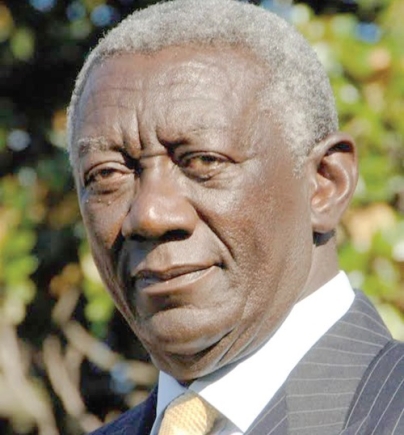There was no shortage of public commentary during the years he was in office, but I had the perfect source for my project: The Afrobarometer survey.
This is my current area of research interest as a political scientist — how the public perceives and feel about the fourth republic presidents.
I began my project with Kufuor’s presidency because three rounds − 2002, 2005, and 2008 – of the Afrobarometer survey occurred during his presidency.
Round Two (2002) occurred a year into his first term in office, Round Three (2005) occurred the first year into his second term after a successful re-election, and Round 4 (2008) occurred in the last year of his second term in office, which was also the final year of his presidency.
This presented a unique opportunity in two ways.
First, the data available covers his entire presidency, thus allowing for a comprehensive description and documentation in a broad narrative of how citizens viewed the years during which he was president.
Second, with three different data points (2002, 2005, and 2008), the narrative was able to show the patterns of how Ghanaians viewed those years, noting any highs and lows, as they experienced his presidency.
The road to the presidency
I had the honour of interviewing the former president as I worked on the project.
One of the memorable quotes he left me with is this “the hazards of politics can be likened to climbing a greasy pole”.
This was in response to my question of whether at any point after losing the flagbearer race in 1992 and losing the 1996 election he considered quitting politics.
He did not have to explain further.
I immediately got the message.
It is not an easy climb to the top of a greasy pole (the presidency), as one is bound to slip down before reaching the summit.
A slide down the greasy pole (a lost election) was not enough reason to quit.
He reminded me that he had been in the business of climbing the greasy pole (politics) for several years.
He finally won the presidency and served two terms.
The overarching question of my work was simple: What did Ghanaians think, feel and say during Kufuor’s Presidency on all governance-related matters?
And to what extent did those change — positively or negatively — throughout his term in office?
Some key observations
Kufuor’s first term was an interesting one.
In one breath, there was a changing perception for the worse about economic conditions combined with a declining sense of optimism.
In another breath, Ghanaians believed his government was addressing well problems in education, health, as well as water and sanitation services.
On matters of economic management, job creation and fighting corruption, the story was different.
Ghanaians rates the performance of his government in 2005 lower than they did in 2002.
Ghanaian perceptions of the Kufuor years improved, and it did so greatly by the end of his term in office.
Overall, the year 2008 as per the results of the Afrobarometer survey was truly a rebound year for the former President.
He regained the lost ground from survey year 2005 and in a lot of cases even surpassed how Ghanaians felt in survey year 2002.
The only place former President Kufuor was unable to see his government’s performance rebound was in fighting corruption.
Although 56 per cent of Ghanaians believed his government was fighting corruption well, it was still seven percentage points shy of the approval enjoyed at the beginning of his term in office (2002).
However, it must be noted that throughout Afrobarometer, the highest rating for the fight against corruption is 58 per cent.
Apart from how well Ghanaians rated government performance in several areas at the end of his presidency, I was struck by how the people of Ghana kept faith with the former President.
It was quite instructive from the data that even when perceptions changed negatively between 2002 and 2005 and matters of the economy and living conditions, he maintained his high job approval rating.
More importantly, Ghanaians increasingly viewed him as one who never ignored the laws or the constitution.
The most intriguing area for me was the question of trust.
How much Ghanaians trusted the president outpaced trust in key governing institutions.
Next stop?
This new line of inquiry is quite interesting as it shows how Ghanaians feel in good and bad times about those they elect as president.
John Mahama’s presidency is next. I am two years into the project and I am already intrigued.
The writer is a Democracy and Development fellow at the Ghana Centre for Democratic Development (CDD-Ghana).

